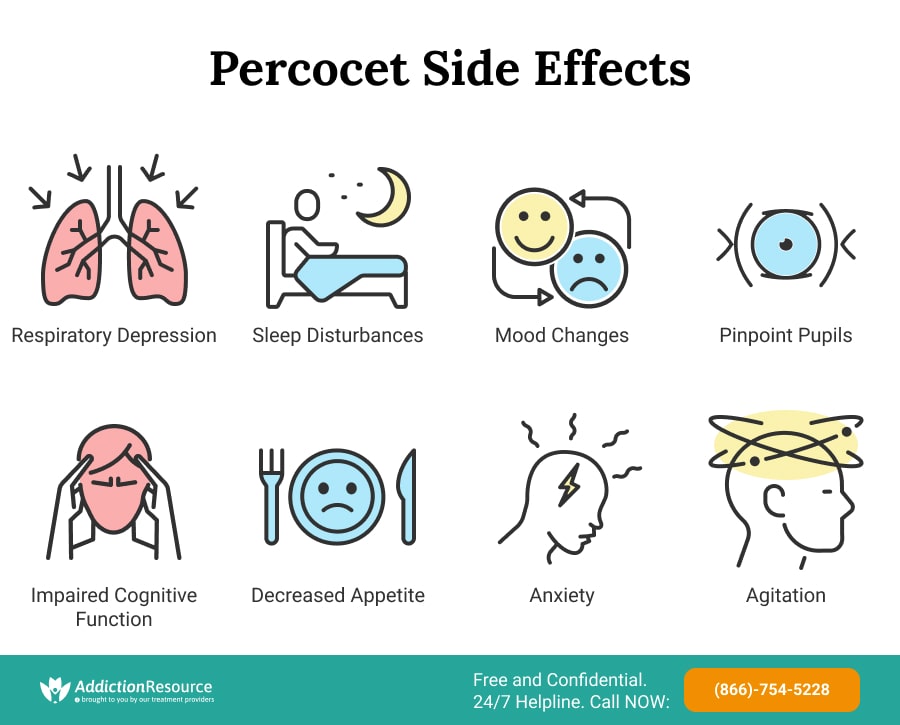Percocet(Oxycodone and Acetaminophen) is a powerful pain reliever. However, when taken, this medication may precipitate secondary effects in other parts of the body. Most of these undesirable reactions can be attributed to the drug’s main constituents, i.e., oxycodone and acetaminophen. Short-term Percocet side effects are experienced moments after consuming the medicine, while long-term occur much later after prolonged use. Taking Percocet during pregnancy can cause damage to the fetus and make newborn babies experience side effects of Percocet and even withdrawal. Knowing the information about the dangers of the medication is essential for avoiding addiction and overdose risks.
Table Of Contents:
Short-Term Side Effects of Percocet
The oxycodone component in Percocet causes the blood vessels in the skin to dilate. It also stimulates the release of histamine within the skin. It results in pruritus (itching) or urticaria (hives) in some people. The itching may also be a manifestation of an allergy. If a patient is worried about stopping Percocet itching, a medical doctor should be asked to prescribe antihistamine medication.

Allergic reactions to the medication may occur in folks who are allergic to Acetaminophen. Most allergic reactions occur as Percocet itching and a minor skin rash. Severe skin lesions are infrequent, but they may happen.
A severe allergic reaction may be characterized by respiratory distress (breathing difficulties), skin hives, itching, vomiting, and swelling of the face, throat, and mouth. Drug fever may also be present. Severe skin reactions may result in Acute generalized exanthematous pustulosis and other potentially fatal conditions such as Toxic epidermal necrolysis and Stevens-Johnson syndrome.
Other Percocet Side Effects Are:
- Respiratory depression. Like most other opioid-based medications, this one also has direct side effects on the brain stem, where it may depress the body's respiratory centers. Drug-induced respiratory depression is, therefore, one of the side effects of Percocet. It results in slowed breathing, which may be irregular.
- Respiratory distress. Respiratory distress in a clinical setting commonly occurs during the initial stages of treatment or when the dosage is increased.
- Sleep Disturbances. Oxycodone action on the opioid receptors in the brain may cause sedation and excessive sleepiness (somnolence). By acting on the brain's dopaminergic pathways, Percocet side effects may also produce hyperactivity and insomnia.
- Mood Changes. Oxycodone exerts its activity on specific groups of neurons, receptors, and neural pathways in the brain. It gives the pain the ability to modulate mood in various ways. Taking the drug may, therefore, result in Percocet side effects of tranquility and later depression. These mood-altering properties are implicated in the development of addiction.
- Pinpoint Pupils. The oxycodone component causes the pupils to constrict, giving the person pinpoint pupils even in complete darkness. The duration of pupil dilation depends on Percocet half-life.
- Impaired Cognitive Function. High doses of acetaminophen may cause dizziness, disorientation, and confusion. These symptoms may also occur in a person who has taken a hefty dose of medication.
- Gastrointestinal Disturbance. Like other alternative pain relievers, for example, Vicodin or Norco, they reduce the rate at which food moves along the digestive tract. It also delays food digestion and decreases peristalsis in the intestines. It results in several side effects within the digestive system, including nausea and indigestion.
Long-Term Side Effects of Percocet
Long-term use of the painkiller can lead to brain damage. Some of the damage caused is life-treating. The risk of serious harm is particularly high among those who abuse the drug.
The Side Effects Of Long-term Use On the Brain Are Evidenced By:
- Impaired cognitive function
- Impaired memory function
- Disturbances in the mood
- Anxiety
- Agitation
- Depression
- Altered perceptions which may cause hallucinations
This medication has a significant effect on blood pressure and heart function. Prolonged use leads to high blood pressure (hypertension), deranged heartbeat (chronic arrhythmia), and heart failure. Due to its effects on the liver, this medication may also lead to coagulopathy (impaired blood clotting).
Prolonged Use Of this Opioid Medication May Cause Other Long-Term Percocet Side Effects Such As:
- Liver toxicity
- Impaired kidney function
- Adrenal insufficiency
- Exacerbation of asthma and Cor Pulmonale
Consequently, one might start taking the drug more frequently, even when there isn’t any clinical need to do so. Frequent drug use modifies the opioid receptors in the brain, making them more tolerant to the drug. Once tolerance becomes one of the side effects of Percocet, the user will need a higher dose or more of the medicine to experience Percocet effects. With time, addiction to the drug gets so reinforced that the individual is dependent on the medication and can’t function without it.
Percocet During Pregnancy
Percocet pregnancy category is C. This drug is an opioid that consists of highly addictive compounds that can lead to physical dependence with prolonged usage. Deciding whether or not to take Oxycodone / Acetaminophen during pregnancy and breastfeeding is an essential decision that pregnant women and lactating mothers must make since these medicines can be detrimental to the mother’s health as well as the infant.

Percocet is an addictive drug, and when used during pregnancy, it can break through the placenta and enter into the fetus’s central nervous system. Meanwhile, occasional use of the substance during pregnancy does not pose huge risks for the infant. However, prolonged use of Oxycodone and Acetaminophen while pregnant can harm the baby’s breathing pattern, as the painkiller lowers the breathing rates and leads to respiratory depression after birth.
Consuming Percocet While Pregnant Could Lead to the Following Side Effects:
- Problems associated with the placenta such as placental insufficiency and abruption
- Restricted fetal growth
- Preeclampsia
- Death of the fetus
- Miscarriage
- Premature membrane ruptures
- Preterm labor
- Premature birth
- Heavy postpartum bleeding
- Intra-amniotic infections
- Fetal membrane inflammation
- Congenital disabilities
- Neural tube defect
- Heart defects
Neonatal Abstinence Syndrome
Neonatal Abstinence Syndrome or NAS refers to the complications faced by the fetus withdrawing from opioid drugs that were consumed by the mother during pregnancy. When taken during pregnancy, Percocet can’t leave the system instantly and often pass on to the newborn through the mother’s bloodstream. Addictive compounds that cause physical dependence, especially when used during pregnancy, can affect the fetus.
The baby’s dependence continues even after the birth, as the newborn’s central nervous system becomes overstimulated, leading to the commencement of withdrawal symptoms. If one uses the painkiller while pregnant, the fetus falls under the risk of Neonatal Abstinence Syndrome to appear.

Symptoms of the disease vary depending on various factors such as the amount and type of substance used, the duration it was used for, and whether the baby is premature or full term. Withdrawal symptoms may begin soon after birth, around 24 – 48 hours after giving birth, or after 5 to 10 days.
Here is a list of Neonatal Abstinence Syndrome most common symptoms – though the symptoms may vary for each newborn.
Full-Term Babies May Experience the Following Withdrawal Symptoms:
- Tremors
- Excessive high-pitched crying
- Insomnia
- Stuffy nose
- Excessive yawning
- Sleeping problems
- Vomiting
- Diarrhea
- Dehydration
- Perspiring
- Muscle spasms
- Fever
- Fluctuations in body temperature
- Pulmonary valve stenosis
- Convulsions
- Slow weight gain
- Excessive sucking
- Rapid breathing
- Blotchy skin
- Poor feeding
- Hypertonicity
Babies experiencing the withdrawal symptoms will often be very irritable and may have a tough time being comforted. Certain babies experiencing severe withdrawal symptoms such as seizures may require medication to treat the problem. IV fluids may be given if the infant has become severely dehydrated. The drugs used to treat the newborn belong to a similar family of the drugs that the baby is withdrawing from. Morphine and methadone are often used to relieve the withdrawal symptoms in infants. Clonidine may also be used to manage severe withdrawal symptoms in infants. The dosage is decreased gradually to help the newborn wean off Percocet.
The treatment may last from around 1 week to 6 months, depending upon the condition severity. Aftercare will be provided regularly once the newbie has recovered from the addiction.
Percocet And Breastfeeding
When a mother takes the medication while breastfeeding, the drug can pass onto the newborn through the breast milk and cause significant harm. According to information on CDC, taking Percocet during pregnancy can have a negative impact on the health of the baby. A survey was conducted on 533 women regarding the effects of oxycodone on infants, and 20% of those women reported that their children were experiencing problems with their central nervous system. A recent report states that Percocet and breastfeeding is not recommended due to the central nervous system issues that it causes in infants.
The warning label on the drug states that lactating mothers should not consume it due to the possibility of the child developing respiratory depression.
Percocet Overdose
A study held by the Center for Disease Control shows that about 200,000 people died from 1995 till 2016 due to an overdose of pain-relieving medications containing opioids.
Percocet overdose is a hazardous condition and can be life-threatening. It happens when an individual takes so much of this drug. It also depends on if the drug is taken with another substance like a mix of Percocet and alcohol.
Percocet overdose is possible anytime giving the circumstances that arise when prescribing or taking the medication. For instance, an amount that could be considered safe for one patient may not be safe for another. Sometimes, if patients use this drug exactly as prescribed, an overdose is still a possibility.
How Dangerous is Percocet Overdose?
The United States Federal Drug Administration indicates that more than 28 billion Acetaminophen products were bought by customers in 2005 only. This includes the number of people buying these products for prescribed or recreational use.
Percocet drug is a Schedule II controlled substance in the United States. It is considered to have high abuse potential and may lead to severe psychological or physical dependence.
Although it is more effective than aspirin, taking more than the recommended daily dose can cause severe Percocet overdose symptoms. Recommended Percocet highest dosage should not exceed 4000 milligrams a day. Anything higher than the daily dosage can lead to Percocet overdose. A paper published by the New York Times states that 78 people die every day just from opioid overdoses, and the misuse of these drugs is on the rise.
Causes Of Percocet Overdose
Many factors can increase patients’ risk of overdose, e.g., taking doses that exceed the regular prescription rate or combinations with other substances, making the condition even more harmful. When a patient takes the painkiller outside the prescribed dosage, they could harm themselves and experience many side effects of abusing it. The misuse of the drug can also cause an overdose.

Another risk factor can occur when a patient builds up a tolerance to the drug. This, in turn, pushes up the dosage to a lethal point. If the person at any point in time relapses, they may try to take up that dosage at the fatal point and unintentionally overdose because their system no longer has that built-up tolerance for the drug.
Other Common Risk Factors to Cause OD May Include:
- Mixing it with stimulants like alcohol
- Combining doses with other drugs regardless of dangerous interactions
- Co-occurring severe health issues like liver disease and kidney disease
- Consumption of fake Percocet medication or drugs that have been tampered with
Percocet Overdose Symptoms
When an overdose is experienced, a patient could go through adverse effects of Oxycodone and Acetaminophen toxicity.
Percocet Overdose Symptoms Include:
- Cold and clammy skin
- Nausea
- Severe drowsiness
- Unconsciousness
- Vomiting
- Irregular respiration
- Dark urine
- Abdominal pain
- Apnea
- Bradycardia
- Circulatory collapse
- Limp muscles
- Severe damage to both kidney and liver
- Low blood pressure
- Seizures
- Coma
If any of these symptoms are noticed, getting immediate medical attention is the best step to take.
Responding to Percocet Overdose
Percocet acts quickly, within about 20-30 minutes after taking a dosage. When a patient overdoses or is suspected that an OD has occurred, don’t wait for symptoms to manifest and contact an emergency medical response team.
Give Them All the Information About the Patient:
- Age
- Weight
- Height
- Current health status
- Past medical information
- Past and current drug prescriptions etc.
Also, telling a doctor about the drug and the dosage used could go a long way. This could help them quickly analyze and decide on a counterpart or procedure to lessen the drug’s effects.
While waiting for medical help, it is advised to keep the patient awake or in an upright standing position. Make sure the environment is not stuffy and has a lot of airflows. Using an antagonist counterpart is also advised. Drugs like Naloxone can help decrease the symptoms or help a lot, but it is not guaranteed to prevent the OD or cure it. For someone who takes opioid drugs, they should have Naloxone at arm’s length.

If these steps are followed accordingly and Percocet overdose symptoms are treated immediately, a patient may successfully prevent further symptoms and reduce the extent of damage induced.
Avoiding the Risks
Painkiller therapy must always be under the strict guidance of a medical doctor. Do not abuse or misuse the drug and buy it only in legal pharmacies.
If a patient is taking Percocet while pregnant for pain-relieving purposes but is concerned regarding the risks of consuming the drug, it is important to consult the doctor before quitting the medication. The intake of such drugs should not be stopped abruptly, as these can cause various health complications. The drug should be tapered off over a specified schedule to prevent Percocet withdrawal symptoms.
Taking higher doses of the medication or mixing it with other drugs or alcohol can lead to overdose. To avoid such risks, it is advisable to always stick to the prescribed dose and contact a healthcare provider in case of any side effects.
If there is substance abuse present, medical help is necessary. Treatment centers provide all necessary tools and a safe environment to get off the painkiller without health complications.
Hope Without Commitment
Find the best treatment options. Call our free and confidential helpline
Most private insurances accepted
Page Sources
- R.B. Raffa, J.V. Pergolizzi, D.J. Segarnick, R.J. Tallarida, OXYCODONE COMBINATIONS FOR PAIN RELIEF, https://www.ncbi.nlm.nih.gov/pmc/articles/PMC4046166/
- Endo Pharmaceuticals Inc, PERCOCET (Oxycodone and Acetaminophen Tablets, USP), 2006. https://www.accessdata.fda.gov/drugsatfda_docs/label/2006/040330s015,040341s013,040434s003lbl.pdf
- U.S Food and Drug Administration, FDA Drug Safety Communication: Prescription Acetaminophen Products to be Limited to 325 mg Per Dosage Unit; Boxed Warning Will Highlight Potential for Severe Liver Failure, 2018. https://www.fda.gov/drugs/drug-safety-and-availability/fda-drug-safety-communication-prescription-acetaminophen-products-be-limited-325-mg-dosage-unit
- America's Deadly Opioid Epidemic By the Numbers, https://www.nbcnewyork.com/news/local/Americas-Deadly-Opioid-Epidemic-By-the-Numbers-458709663.html
- Claire McCarthy, MD, Number of babies born in withdrawal from prescription painkillers is on the rise, 2015. https://www.health.harvard.edu/blog/number-of-babies-born-withdrawing-from-prescription-painkillers-on-the-rise-201504277949
- Centers for Disease Control and Prevention, Use of Pain Medicine During Early Pregnancy May Be Related To Birth Defects, 2020. https://www.cdc.gov/pregnancy/meds/treatingfortwo/features/pain-med-usage.html
- Riadh Daghfous, Sihem El Aidli, Anis Jday, Sarrah Kastalli, Anis Klouz, Samia Srairi, Mohamed Lakhal, Mohamed-Hédi Loueslati, Chelbi Belkahia, [Allergic reactions to paracetamol], 2015. https://pubmed.ncbi.nlm.nih.gov/16433019/
- K Leino, L Mildh, K Lertola, T Seppälä, O Kirvelä, Time course of changes in breathing pattern in morphine- and oxycodone-induced respiratory depression, 1999. https://pubmed.ncbi.nlm.nih.gov/10460553/
- Wojciech Leppert, The impact of opioid analgesics on the gastrointestinal tract function and the current management possibilities, 2012. https://www.ncbi.nlm.nih.gov/pmc/articles/PMC3687404/
- FDA. Acetaminophen: Avoiding Liver Injury, 2009. https://www.fda.gov/consumers/consumer-updates/acetaminophen-avoiding-liver-injury
- Centers for Disease Control and Prevention, About Opioid Use During Pregnancy, 2020. https://www.cdc.gov/pregnancy/opioids/basics.html
- MedLine plus, Opioid Overdose. https://medlineplus.gov/opioidoverdose.html




